Just because someone is a warm lead, it doesn’t mean they want to buy from you right at that moment. But you can increase your chances of getting them to the next stage of your sales cycle with a well-scripted warm call.
Why Is a Script Important for Warm Calls?
There are many things you need to do when you prepare for a warm call, including personalizing your script.
You can think of the script as a sort of warm calling framework; it serves as a guide that will ensure you mention all the key points you want to. It can help boost your confidence, as you’ve got all the essential information on-hand. And it can help streamline your warm calling process, because it can be reused and personalized each time.
Plus, a script will help shape your pre-call research because there are clear information gaps that you need to fill before you dial.
How Should You Structure Your Warm Call?
The best way to write your warm call script is to review what’s working for your other calls and bring together the most impactful elements.
But if you’re not sure where to start, there are seven main things your structure needs to do:
- Introduce yourself and get their attention with a friendly warm call opener
- Explain why you’re calling
- Discover what their challenges are
- Establish their needs and try to understand their buyer intent
- Match your value proposition to their requirements
- Summarize their challenge and how you can help
- Close and move the conversation on to the next steps
Example Warm Call Script
This example warm call script has been written from the viewpoint of a salesperson at an outbound telemarketing company who’s reaching out to a prospect that has already downloaded an eBook from their website.
Introduction
| Sales Rep: | Hi [prospect’s name], this is [your name] from [company]. How are you today? |
| I’m calling because I noticed you [engagement] and I wondered if you had a few minutes to talk about how we could help you [outcome]. |
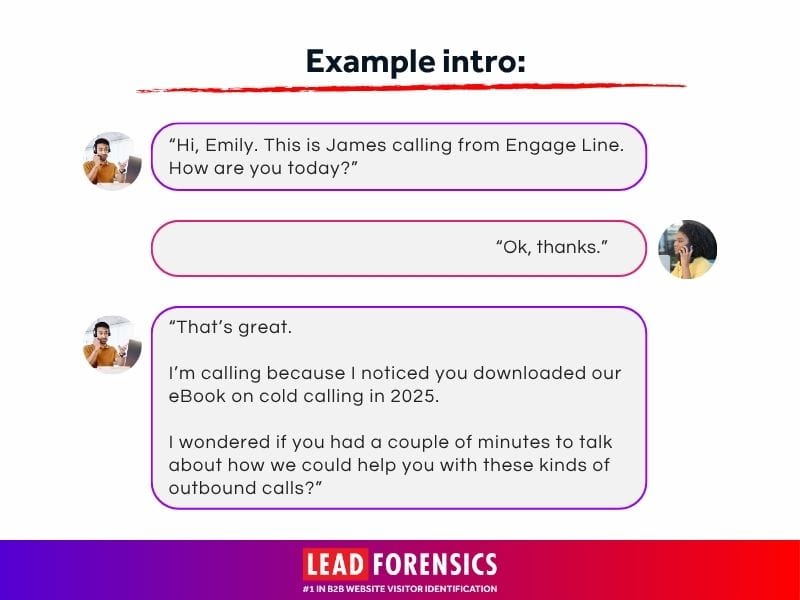
Discovery
| Prospect | agrees to hear more. |
| Sales Rep: | That’s great, thank you. |
| Just to make sure we’re a good fit; do you mind walking me through what are the biggest challenges you’re facing in your role and what tools help you with that challenge? | |
| [ask more discovery questions] |
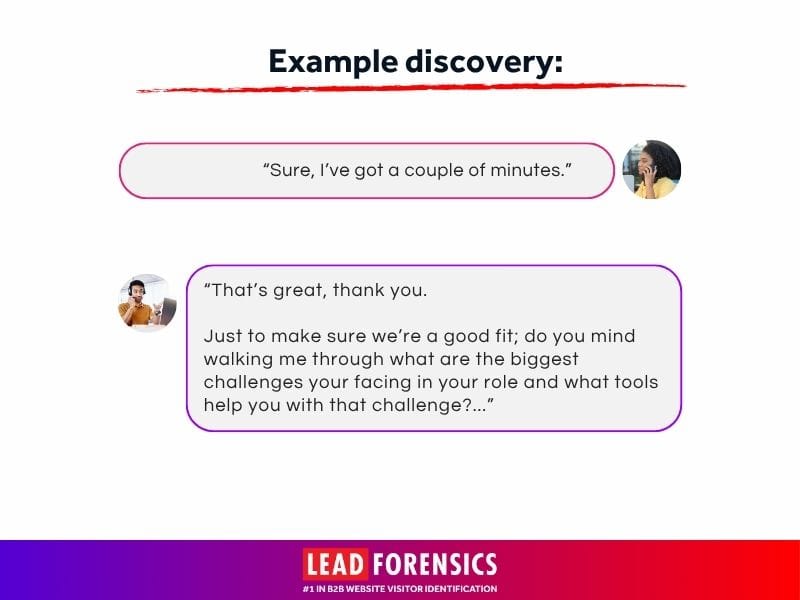
Establish needs
| Sales Rep: | Ok, so it sounds like your biggest challenge is [summarize challenges/pain points]. |
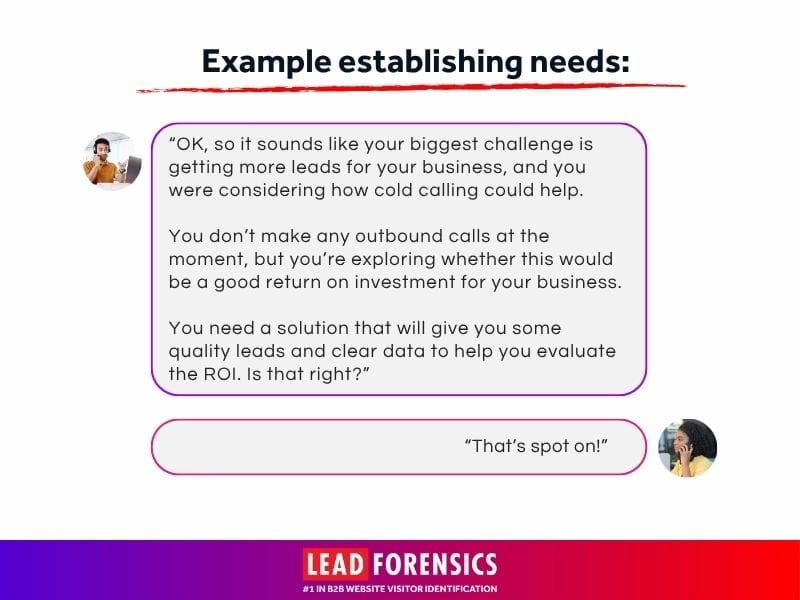
Match value proposition with social proof
| Sales Rep: | [Explain how your solution will solve their needs] |
| We’ve already helped other companies with a similar issue. Can I tell you about how we supported [company] to achieve [result]? | |
| [talk through a relevant case study] |
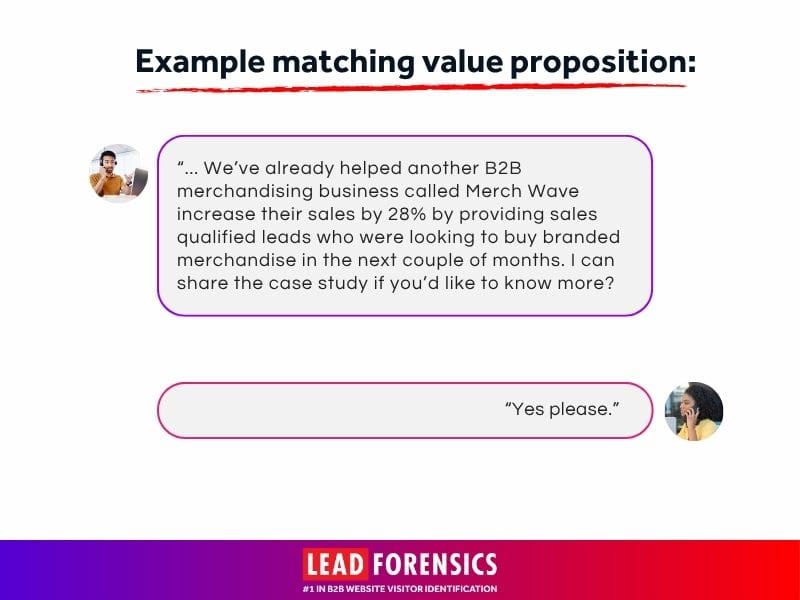
Summarize and Close
| Sales Rep: | Just as we did for [case study], our [solution] could help [company name] to [result]. |
| The next steps are simple; we’ll show you a short demo and see if there’s a good fit. I’m free at 2pm today or 10am tomorrow. What would work best for you? |
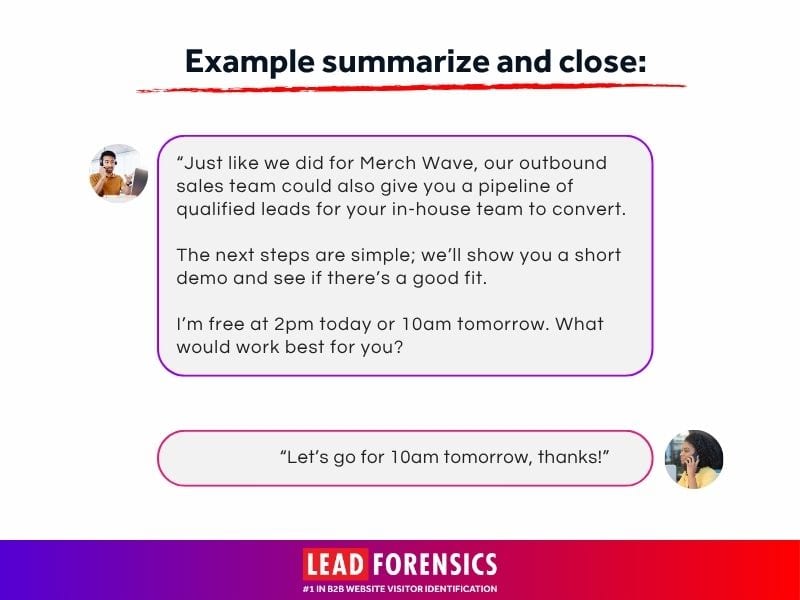
Tips For Writing Your Warm Call Script
When you’re developing your own script ahead of your warm calls, there are a few tips and tricks from sales experts that will help you refine your message.
Simplify Your Language
No matter how complex or straightforward your solution is, if you can strip away the marketing speak and communicate the most relevant features and benefits plainly, you’ll help your prospects understand more easily.
The best way to do this is to get all the information you can about your company and its products or solutions and truly digest what it all means. Try explaining what your business does in plain English and keep practicing until you find the perfect way to express this in your own words.
Being able to explain the solution more directly will help your warm call feel more like a conversation and less like a sales pitch.
Use Job Titles to Tailor Your Message
You probably know what your warm lead’s job title is, which means you can use that to take a guess at what they’re most likely to be concerned about.
You can usually divide people into two groups: those who are concerned about pain points and those who want to focus on growth opportunities. From this assumption, you can tailor your message.
For example, a Finance Director or other finance professional might be frustrated by the cost of a current solution or feel the pain of being held back by not having the best tools in place. In this instance, you can focus on how your solution can spare them from the pain of their status quo.
Meanwhile, a Marketing Manager or someone in another marketing-focused role might be most interested in growth and how your solution can help them get more leads or a better return on investment (ROI). In this scenario, you can talk about how your solution can unlock new avenues of growth.
Build Connection Through Storytelling
You can use stories to make your pre-planned script feel more spontaneous and human.
Storytelling can be as simple as talking about an existing case study, but it’s powerful because it helps you take the prospect on a journey and paint a picture of how you could resolve a similar challenge.
When you’re thinking about how to phrase your customer story, make sure you put the client in the heart of the story and position them as the hero. Build your narrative around how your hero succeeded, and how you were able to help.
Not only does a story help the prospect to remember the case study, but it will also help them to remember you when you follow up your warm call.
Use Website Visitor Identification Tools For More Insights
If you can get detail on which pages are being viewed by prospective client companies, you can get an even better understanding of what they might be looking for and how you could help.
This is possible with visitor identification software like Lead Forensics. It will tell you which companies are visiting your website, what pages they look at, and how they find your site, so you can prepare more thoroughly and better personalize your script.










